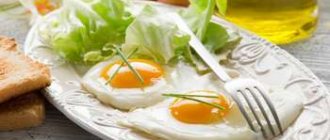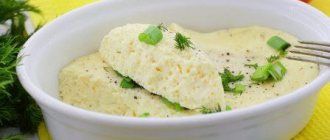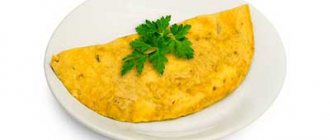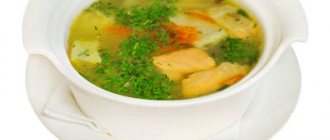Calorie content and nutritional value of an omelet made from 2 eggs and milk
This food product is included in the diet of BZHU supporters as a convenient breakfast option, ready to give you a feeling of fullness for several hours.
The final nutritional value of a dish depends on a significant number of additional factors. Including:
- The size of the selected eggs. Small ones weigh about 30 grams, medium ones about 40 grams, large ones can reach a weight of 90 grams.
- Type of additional fillers, choice of milk of varying degrees of fat, cream.
- The choice of oil for frying or not using oil.
The dish, which was prepared from medium-sized eggs, from 40 to 50 grams, contains about 135 kcal per 100 grams.
Classic recipe
The simplest way to prepare this widespread and well-known dish is to use two medium-sized eggs, approximately 50 grams of medium-fat milk.
Break the eggs into a deep container and beat until thick foam appears with salt and spices. At the end of the beating, add milk and continue using the mixer or whisk. The finished mass should be knocked out into a preheated frying pan.
When cooking, both vegetable and butter can be used. The use of this component will significantly increase calorie content. It can increase to 230 kcal per 100 grams. When following healthy eating principles, it is recommended to use a non-stick frying pan or steam an omelet.
When calculating the BJU in the case of preparing the option in oil, the finished omelette will include:
- about 25.5 grams of fat, which is about 72% of the daily value
- about 19 grams of protein, which is approximately 24% of the norm for BJU proteins per day
- approximately 3.5 grams of carbohydrates, or about 4% of the daily value of BZHU
Good to know! It is no coincidence that this dish is recognized as a healthy and tasty breakfast option. It brings a large amount of nutrients to the body, becoming a good food base for the whole day.
Other omelet recipes
The recipes for this delicious dish include a wide range of options, including a variety of additional ingredients. Such additions can significantly change overall caloric intake.
The list of additives that are not recommended for supporters of a healthy lifestyle and healthy lifestyle includes cheese, sausages, sausage, croutons made from white wheat bread, and lard. In this case, those who are not yet accustomed to the principles of healthy eating will have to remind themselves that everything “delicious” and “fatty” ultimately becomes harmful and contributes to weight gain.
Note! It is useful to diversify the classic recipe using vegetable additives. For example, tomatoes or cauliflower will reduce your overall caloric intake. When using cauliflower, this figure will decrease from 230 to 135 kcal per 100 grams.
How to cook a low-calorie omelette?
Proponents of proper nutrition can pay attention to dish options with minimal calorie content:
- An omelette steamed only from whites without the use of yolks and milk will add only 70 kcal per 100 grams to the calorie table.
- An omelet with tomato added will only contain 98 kcal.
- If you use bell pepper, the figure will change and be 76 kcal.
- By adding mushrooms, you can get a dish with a nutritional value of 83 kcal.
- Including broccoli in the egg mixture will increase the figure to 104 kcal.
- You can add chicken breast to get up to 138 kcal per 100 g.
Note! To reduce nutritional value, it is also recommended to use milk with a fat content of 2.5%. When planning to add cheese, you will need to give preference to low-fat varieties.
What kind of omelet is possible on a diet?
Having figured out how many calories are in an omelet made from 2 eggs and milk, it’s time to think about how much of a dietary dish this really is. Many are accustomed to perceive it as breakfast and 240 kcal is not quite what seems acceptable. Especially if you also add vegetables, a couple of breads, and beans. The classic omelette made from large eggs is indeed not the easiest, but it will be more than dietary if you follow only 2 rules:
- Do not fry in oil - it is better to buy a good frying pan with a non-stick coating. The omelette will still have a crust, but you won’t have to use any fat.
- Take only egg whites: the main weight of the egg is the yolk. If you use only the protein from 2 eggs, it will be only 40-70 g. At the same time, the calorie content of 100 g of protein is only 44 kcal. Such an omelet, and even with lactose-free milk, will have only 45 kcal. And this includes large eggs.
Also, do not forget that in an omelet with a full egg (with yolk) there is enough fat, so you should not serve the dish with cheese. Just as it is undesirable to combine it with sausage, frankfurters, meat - the result will be a difficult tandem to digest, and even with a high calorie content. Dilute the composition with herbs, cucumbers, and peppers. And if the milk in the refrigerator is only full-fat, dilute it half and half with water.
The benefits of omelet for weight loss
A dish made only from eggs with a small addition of low-fat milk can be called one of the most successful food options for weight loss supporters.
The benefits of eggs include the inclusion in the composition of a chicken egg:
- Vitamin A necessary for immunity, optimal condition of skin, hair and nails
- B vitamins that are beneficial for the immune system and nervous system.
- Vitamins of group D that promote natural vasodilation.
- Vitamin E, ready to heal wounds and strengthen the walls of blood vessels.
Good to know! This product also contains a large number of microelements and nutrients. Including magnesium, sodium, folic acid, iron, iodine and other components. Lutein helps break down bad cholesterol.
How many calories are in a 3 egg omelette with milk?
Here's how much:
We prepare this dish with the following recipe:
Products:
- Chicken egg - 3 pcs. — (235 kcal)
- Milk 2.5% - 100 ml. — (52 kcal)
- Wheat flour - 0.5 tbsp. — (24 kcal)
- Salt - to taste.
- Vegetable oil - 1 tbsp. — (144 kcal)
How to cook:
- Break the eggs and pour into a bowl, add milk, flour and salt.
- Beat the mixture thoroughly with a whisk or just a fork until smooth.
- Pour the egg mixture into a frying pan heated with vegetable oil, cover the frying pan with a lid and bake the omelette in the frying pan for 10-15 minutes over low heat until cooked.
Based on the posted recipe:
The calorie content of an omelet with milk from 3 eggs, per 100 grams, is:
Possible harm from omelet
The most well-known negative aspect of eating this food product is the possible occurrence of allergic reactions. Most often they are caused by components that make up the yolk. Preparing a dish only from proteins almost completely eliminates the possibility of allergies.
It is important to cook any eggs correctly. They can be carriers of such dangerous diseases as salmonellosis. Risks also include overindulgence in omelettes cooked in any type of oil.
This method of preparation reduces the nutritional properties by at least two times and contributes to the appearance of harmful, blood-clogging cholesterol.
Good to know! In conclusion, it is worth paying attention to the benefits of any natural food products that undergo minimal additional processing during the preparation process. The simplest classic omelette, steamed or oven-cooked, becomes one of the best sources of healthy nutrients that every BJU supporter needs.
Omelette recipe (1 serving - 80 g). Calorie, chemical composition and nutritional value.
Nutritional value and chemical composition of “Omelet (1 serving – 80 g)”.
The table shows the nutritional content (calories, proteins, fats, carbohydrates, vitamins and minerals) per 100 grams of edible portion.
| Nutrient | Quantity | Norm** | % of the norm in 100 g | % of the norm in 100 kcal | 100% normal |
| Calorie content | 196.4 kcal | 1684 kcal | 11.7% | 6% | 857 g |
| Squirrels | 10.7 g | 76 g | 14.1% | 7.2% | 710 g |
| Fats | 16.1 g | 56 g | 28.8% | 14.7% | 348 g |
| Carbohydrates | 2.3 g | 219 g | 1.1% | 0.6% | 9522 g |
| Water | 70.2 g | 2273 g | 3.1% | 1.6% | 3238 g |
| Ash | 0.75 g | ~ | |||
| Vitamins | |||||
| Vitamin A, RE | 195 mcg | 900 mcg | 21.7% | 11% | 462 g |
| Retinol | 0.188 mg | ~ | |||
| beta carotene | 0.045 mg | 5 mg | 0.9% | 0.5% | 11111 g |
| Vitamin B1, thiamine | 0.053 mg | 1.5 mg | 3.5% | 1.8% | 2830 g |
| Vitamin B2, riboflavin | 0.33 mg | 1.8 mg | 18.3% | 9.3% | 545 g |
| Vitamin B4, choline | 188.25 mg | 500 mg | 37.7% | 19.2% | 266 g |
| Vitamin B5, pantothenic | 0.975 mg | 5 mg | 19.5% | 9.9% | 513 g |
| Vitamin B6, pyridoxine | 0.105 mg | 2 mg | 5.3% | 2.7% | 1905 |
| Vitamin B9, folates | 5.25 mcg | 400 mcg | 1.3% | 0.7% | 7619 g |
| Vitamin B12, cobalamin | 0.39 mcg | 3 mcg | 13% | 6.6% | 769 g |
| Vitamin D, calciferol | 1.65 mcg | 10 mcg | 16.5% | 8.4% | 606 g |
| Vitamin E, alpha tocopherol, TE | 0.45 mg | 15 mg | 3% | 1.5% | 3333 g |
| Vitamin H, biotin | 15.15 mcg | 50 mcg | 30.3% | 15.4% | 330 g |
| Vitamin K, phylloquinone | 0.2 mcg | 120 mcg | 0.2% | 0.1% | 60000 g |
| Vitamin RR, NE | 2.7 mg | 20 mg | 13.5% | 6.9% | 741 g |
| Niacin | 0.143 mg | ~ | |||
| Macronutrients | |||||
| Potassium, K | 105 mg | 2500 mg | 4.2% | 2.1% | 2381 g |
| Calcium, Ca | 41.25 mg | 1000 mg | 4.1% | 2.1% | 2424 g |
| Magnesium, Mg | 9 mg | 400 mg | 2.3% | 1.2% | 4444 g |
| Sodium, Na | 100.5 mg | 1300 mg | 7.7% | 3.9% | 1294 g |
| Sera, S | 132 mg | 1000 mg | 13.2% | 6.7% | 758 g |
| Phosphorus, P | 144 mg | 800 mg | 18% | 9.2% | 556 g |
| Chlorine, Cl | 117 mg | 2300 mg | 5.1% | 2.6% | 1966 |
| Microelements | |||||
| Iron, Fe | 1.875 mg | 18 mg | 10.4% | 5.3% | 960 g |
| Yod, I | 15 mcg | 150 mcg | 10% | 5.1% | 1000 g |
| Cobalt, Co | 7.5 mcg | 10 mcg | 75% | 38.2% | 133 g |
| Manganese, Mn | 0.0217 mg | 2 mg | 1.1% | 0.6% | 9217 g |
| Copper, Cu | 62.25 mcg | 1000 mcg | 6.2% | 3.2% | 1606 g |
| Molybdenum, Mo | 4.5 mcg | 70 mcg | 6.4% | 3.3% | 1556 g |
| Selenium, Se | 23.025 mcg | 55 mcg | 41.9% | 21.3% | 239 g |
| Fluorine, F | 41.25 mcg | 4000 mcg | 1% | 0.5% | 9697 g |
| Chromium, Cr | 3 mcg | 50 mcg | 6% | 3.1% | 1667 g |
| Zinc, Zn | 0.8325 mg | 12 mg | 6.9% | 3.5% | 1441 g |
| Digestible carbohydrates | |||||
| Mono- and disaccharides (sugars) | 0.5 g | max 100 g | |||
| Essential amino acids | |||||
| Arginine* | 0.593 g | ~ | |||
| Valin | 0.578 g | ~ | |||
| Histidine* | 0.255 g | ~ | |||
| Isoleucine | 0.45 g | ~ | |||
| Leucine | 0.81 g | ~ | |||
| Lysine | 0.675 g | ~ | |||
| Methionine | 0.315 g | ~ | |||
| Methionine + Cysteine | 0.54 g | ~ | |||
| Threonine | 0.458 g | ~ | |||
| Tryptophan | 0.15 g | ~ | |||
| Phenylalanine | 0.488 g | ~ | |||
| Phenylalanine+Tyrosine | 0.848 g | ~ | |||
| Nonessential amino acids | |||||
| Alanin | 0.533 g | ~ | |||
| Aspartic acid | 0.923 g | ~ | |||
| Glycine | 0.315 g | ~ | |||
| Glutamic acid | 1.328 g | ~ | |||
| Proline | 0.3 g | ~ | |||
| Serin | 0.698 g | ~ | |||
| Tyrosine | 0.36 g | ~ | |||
| Cysteine | 0.217 g | ~ | |||
| Sterols (sterols) | |||||
| Cholesterol | 427.5 mg | max 300 mg | |||
| Saturated fatty acids | |||||
| Saturated fatty acids | 2.3 g | max 18.7 g | |||
| 14:0 Miristinovaya | 0.03 g | ~ | |||
| 15:0 Pentadecane | 0.008 g | ~ | |||
| 16:0 Palmitinaya | 1.538 g | ~ | |||
| 17:0 Margarine | 0.023 g | ~ | |||
| 18:0 Stearic | 0.66 g | ~ | |||
| 20:0 Arakhinovaya | 0.023 g | ~ | |||
| Monounsaturated fatty acids | 3.728 g | min 16.8 g | 22.2% | 11.3% | |
| 16:1 Palmitoleic | 0.293 g | ~ | |||
| 17:1 Heptadecene | 0.008 g | ~ | |||
| 18:1 Oleic (omega-9) | 3.068 g | ~ | |||
| 20:1 Gadoleic (omega-9) | 0.03 g | ~ | |||
| Polyunsaturated fatty acids | 0.945 g | from 11.2 to 20.6 g | 8.4% | 4.3% | |
| 18:2 Linolevaya | 0.825 g | ~ | |||
| 18:3 Linolenic | 0.045 g | ~ | |||
| 20:4 Arachidonic | 0.075 g | ~ | |||
| Omega-3 fatty acids | 0.1 g | from 0.9 to 3.7 g | 11.1% | 5.7% | |
| Omega-6 fatty acids | 1.3 g | from 4.7 to 16.8 g | 27.7% | 14.1% |
The energy value of Omelet (1 serving - 80 g) is 196.4 kcal.
Primary Source: Created in the application by the user. Read more.
** This table shows the average levels of vitamins and minerals for an adult. If you want to know the norms taking into account your gender, age and other factors, then use the “My Healthy Diet” application.
Recipe for Omelet with 1 egg and milk. Calorie, chemical composition and nutritional value.
Nutritional value and chemical composition of “Omelette made from 1 egg and milk.”
The table shows the nutritional content (calories, proteins, fats, carbohydrates, vitamins and minerals) per 100 grams of edible portion.
| Nutrient | Quantity | Norm** | % of the norm in 100 g | % of the norm in 100 kcal | 100% normal |
| Calorie content | 86.2 kcal | 1684 kcal | 5.1% | 5.9% | 1954 |
| Squirrels | 6 g | 76 g | 7.9% | 9.2% | 1267 g |
| Fats | 5.6 g | 56 g | 10% | 11.6% | 1000 g |
| Carbohydrates | 3.1 g | 219 g | 1.4% | 1.6% | 7065 g |
| Organic acids | 0.1 g | ~ | |||
| Water | 80.9 g | 2273 g | 3.6% | 4.2% | 2810 g |
| Ash | 0.772 g | ~ | |||
| Vitamins | |||||
| Vitamin A, RE | 96.8 mcg | 900 mcg | 10.8% | 12.5% | 930 g |
| Retinol | 0.085 mg | ~ | |||
| beta carotene | 0.023 mg | 5 mg | 0.5% | 0.6% | 21739 g |
| Vitamin B1, thiamine | 0.032 mg | 1.5 mg | 2.1% | 2.4% | 4688 g |
| Vitamin B2, riboflavin | 0.22 mg | 1.8 mg | 12.2% | 14.2% | 818 g |
| Vitamin B4, choline | 83.67 mg | 500 mg | 16.7% | 19.4% | 598 g |
| Vitamin B5, pantothenic | 0.433 mg | 5 mg | 8.7% | 10.1% | 1155 g |
| Vitamin B6, pyridoxine | 0.047 mg | 2 mg | 2.4% | 2.8% | 4255 g |
| Vitamin B9, folates | 5.333 mcg | 400 mcg | 1.3% | 1.5% | 7500 g |
| Vitamin B12, cobalamin | 0.173 mcg | 3 mcg | 5.8% | 6.7% | 1734 g |
| Vitamin C, ascorbic acid | 0.2 mg | 90 mg | 0.2% | 0.2% | 45000 g |
| Vitamin D, calciferol | 0.733 mcg | 10 mcg | 7.3% | 8.5% | 1364 g |
| Vitamin E, alpha tocopherol, TE | 0.2 mg | 15 mg | 1.3% | 1.5% | 7500 g |
| Vitamin H, biotin | 6.733 mcg | 50 mcg | 13.5% | 15.7% | 743 g |
| Vitamin K, phylloquinone | 0.1 mcg | 120 mcg | 0.1% | 0.1% | 120000 g |
| Vitamin RR, NE | 1.8 mg | 20 mg | 9% | 10.4% | 1111 g |
| Niacin | 0.117 mg | ~ | |||
| Macronutrients | |||||
| Potassium, K | 134.27 mg | 2500 mg | 5.4% | 6.3% | 1862 |
| Calcium, Ca | 90.93 mg | 1000 mg | 9.1% | 10.6% | 1100 g |
| Magnesium, Mg | 12.4 mg | 400 mg | 3.1% | 3.6% | 3226 g |
| Sodium, Na | 74.67 mg | 1300 mg | 5.7% | 6.6% | 1741 g |
| Sera, S | 58.67 mg | 1000 mg | 5.9% | 6.8% | 1704 g |
| Phosphorus, P | 118.6 mg | 800 mg | 14.8% | 17.2% | 675 g |
| Chlorine, Cl | 118.67 mg | 2300 mg | 5.2% | 6% | 1938 |
| Microelements | |||||
| Aluminium, Al | 33.3 mcg | ~ | |||
| Iron, Fe | 0.893 mg | 18 mg | 5% | 5.8% | 2016 |
| Yod, I | 12.67 mcg | 150 mcg | 8.4% | 9.7% | 1184 g |
| Cobalt, Co | 3.933 mcg | 10 mcg | 39.3% | 45.6% | 254 g |
| Manganese, Mn | 0.0164 mg | 2 mg | 0.8% | 0.9% | 12195 g |
| Copper, Cu | 34.33 mcg | 1000 mcg | 3.4% | 3.9% | 2913 g |
| Molybdenum, Mo | 5.333 mcg | 70 mcg | 7.6% | 8.8% | 1313 g |
| Tin, Sn | 10 mcg | ~ | |||
| Selenium, Se | 11.233 mcg | 55 mcg | 20.4% | 23.7% | 490 g |
| Strontium, Sr | 11.33 mcg | ~ | |||
| Fluorine, F | 31.67 mcg | 4000 mcg | 0.8% | 0.9% | 12630 g |
| Chromium, Cr | 2.67 mcg | 50 mcg | 5.3% | 6.1% | 1873 |
| Zinc, Zn | 0.6367 mg | 12 mg | 5.3% | 6.1% | 1885 |
| Digestible carbohydrates | |||||
| Mono- and disaccharides (sugars) | 3.2 g | max 100 g | |||
| Essential amino acids | |||||
| Arginine* | 0.263 g | ~ | |||
| Valin | 0.257 g | ~ | |||
| Histidine* | 0.113 g | ~ | |||
| Isoleucine | 0.2 g | ~ | |||
| Leucine | 0.36 g | ~ | |||
| Lysine | 0.3 g | ~ | |||
| Methionine | 0.14 g | ~ | |||
| Methionine + Cysteine | 0.24 g | ~ | |||
| Threonine | 0.203 g | ~ | |||
| Tryptophan | 0.067 g | ~ | |||
| Phenylalanine | 0.217 g | ~ | |||
| Phenylalanine+Tyrosine | 0.377 g | ~ | |||
| Nonessential amino acids | |||||
| Alanin | 0.237 g | ~ | |||
| Aspartic acid | 0.41 g | ~ | |||
| Glycine | 0.14 g | ~ | |||
| Glutamic acid | 0.59 g | ~ | |||
| Proline | 0.133 g | ~ | |||
| Serin | 0.31 g | ~ | |||
| Tyrosine | 0.16 g | ~ | |||
| Cysteine | 0.097 g | ~ | |||
| Sterols (sterols) | |||||
| Cholesterol | 196 mg | max 300 mg | |||
| Saturated fatty acids | |||||
| Saturated fatty acids | 2.3 g | max 18.7 g | |||
| 14:0 Miristinovaya | 0.013 g | ~ | |||
| 15:0 Pentadecane | 0.003 g | ~ | |||
| 16:0 Palmitinaya | 0.683 g | ~ | |||
| 17:0 Margarine | 0.01 g | ~ | |||
| 18:0 Stearic | 0.293 g | ~ | |||
| 20:0 Arakhinovaya | 0.01 g | ~ | |||
| Monounsaturated fatty acids | 1.657 g | min 16.8 g | 9.9% | 11.5% | |
| 16:1 Palmitoleic | 0.13 g | ~ | |||
| 17:1 Heptadecene | 0.003 g | ~ | |||
| 18:1 Oleic (omega-9) | 1.363 g | ~ | |||
| 20:1 Gadoleic (omega-9) | 0.013 g | ~ | |||
| Polyunsaturated fatty acids | 0.42 g | from 11.2 to 20.6 g | 3.8% | 4.4% | |
| 18:2 Linolevaya | 0.367 g | ~ | |||
| 18:3 Linolenic | 0.02 g | ~ | |||
| 20:4 Arachidonic | 0.033 g | ~ | |||
| Omega-6 fatty acids | 0.4 g | from 4.7 to 16.8 g | 8.5% | 9.9% |
The energy value of an omelet made from 1 egg and milk is 86.2 kcal.
Primary Source: Created in the application by the user. Read more.
** This table shows the average levels of vitamins and minerals for an adult. If you want to know the norms taking into account your gender, age and other factors, then use the “My Healthy Diet” application.








